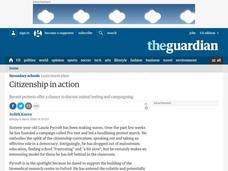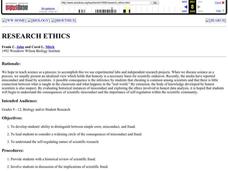Curated OER
Firestorms: The Bombing of Civilians in World War II: War, Ethics, Guernica, Precision Bombing
Students explore the history, rationale and ethics of civilian bombing in times of war. They consider war strategy, the laws and conventions of war and international implications.
University of Minnesota
Whose Choice Is It Anyway?
Your taste buds may be saying Pepsi, but your brain is saying Coke! By analyzing experimental research, learners discover ways in which our brains impact decision making. They conclude with a discussion of neuromarketing and how it...
Curated OER
Should US Officials & Health Professionals be Investigated for War Crimes?
Young scholars explore ethical issues. For this human rights lesson, students read articles and documents related to torture used in government investigations and if medical ethical guidelines were adhered to. Young scholars respond to...
Curated OER
Pharmaceuticals and Treatments
Students perform an experiment involving reverse transcriptase-polymerized chain reaction HIV replication to better examine the biotechnology used by scientists in pharmaceutical research of infections diseases like HIV. Students examine...
Curated OER
Research Ethics
Young scientists discuss the results of carelessness during experimentation and the temptation to misrepresent findings. These activities are intended to develop the ability to identify scientific error, misconduct, and fraud. Use this...
Curated OER
Jurassic Park: The Science and Ethics of Genetic Engineering
Explore genetic engineering through an engaging "Jurassic Park" unit, which is an extensive use of a cross-curricular teaching event. Planned for AP Biology, English, and Calculus young scholars, learners and teachers are involved for...
Curated OER
The Secret is Out
High schoolers research history of biomedical research and development of ethics in clinical trials, define informed consent, describe primary components of informed consent decision, and discuss government's role in protecting rights of...
Curated OER
Citizenship in Action
Students discover citizenship at work. In this current events lesson, students visit selected websites to discover information about animal testing and discuss how to solve some of the issues associated with animal experimentation.
Curated OER
Handling Discrepancies
Eleventh graders study the different ways students handle discrepancies. In this Physics lesson, 11th graders perform a laboratory experiment with resistors. Students discuss the ethical issues it raises.
Penguin Books
An Educator’s Guide to Chraisma by Jeanne Ryan
Often, science fiction makes a lot of connections to real life. An educator's guide for the novel Charisma by Jeanne Ryan, has readers discuss many of the real-life issues that come in the text. A brief summary helps garner interest...
National Center for Case Study Teaching in Science
Bad Blood
When it comes to science and medicine, ethics should always be a primary consideration; unfortunately, that has not always been the case. There are countless examples throughout history of questionable medical practices, marginalized...
Curated OER
Noncombatancy and the Seventh day Adventist Church
Upper graders investigate how the Seventh Day Adventists are objectors to the practice of war. The lesson covers the Civil War and examines the church's position about the practice of war. The research extends to modern wars and learners...
Curated OER
Research Ethics
Students develop an ability to distinguish between simple error, misconduct and fraud. Students are lead to consider a widening circle of the consequences of misconduct and fraud. They expand their knowledge on the self-regulating...
Curated OER
Editing Emily's Way: An Exercise in Diction and Its Implications
Students examine the poetry of Emily Dickinson and the diction in her poetry. In this poetry analysis lesson plan, students read Dickinson poetry and analyze the diction in the poems. Students journal about the poetry and rewrite their...
Curated OER
The Science of Aging
Students reflect on the lives of older people they know, then research and debate the key issues surrounding scientific experimentation in anti-aging. They write a short story that reflects their own philosophical beliefs on aging and...
Curated OER
Stimulus Response
Middle schoolers explore the five steps in the stimulus-response pathway. They analyze the senses and the difference between animals' primary and secondary senses. Students collect information about animal behavior to debate the ethics...
Curated OER
Have I Been Hacked?
Young scholars investigate how effective SNEAK strategies are in detecting hackers. In this technology lesson, students explain the ethical issues about hacking. They graph and analyze their experimental results.
Curated OER
A Man of Integrity and Courage
Pupils read one of the most important articles in modern medical history on the importance of conducting research in an ethical manner that includes participants who give informed consent.
Curated OER
Genetic Counseling
Students apply the principles of ethical decision making to actual cases. They appreciate that there is usually no one "right" decision. Students compare their conclusions to those of individuals who are in the field.
Curated OER
Munching Mice
Young scholars examine different variables and their effects on weight gain in mice. They consider the validity of relating the results in mice to humans.Finally, they discuss the ethics of using animals in experiments.
Curated OER
Yeast Cells and Their Environment
Students create their own experiment in which they have yeast cells growing in liquid environments. They examine the relationship between humans and microorganisms. They also practice using the scientific method.
Curated OER
What Is It; Whose Is It; Where Did It Come From?
Pupils discover which elements are most threatening to outdoor sculptures. In groups, they determine the steps that are needed to preserve them. They locate and assess the condition of those sculptures in their local community. They...
Curated OER
Population Density
Students use the scientific method to conduct an experiment and use varied methods to gather background information. They correctly use lab equipment and prepare tables and graphs that organize, conclude, and present their findings. ...






















